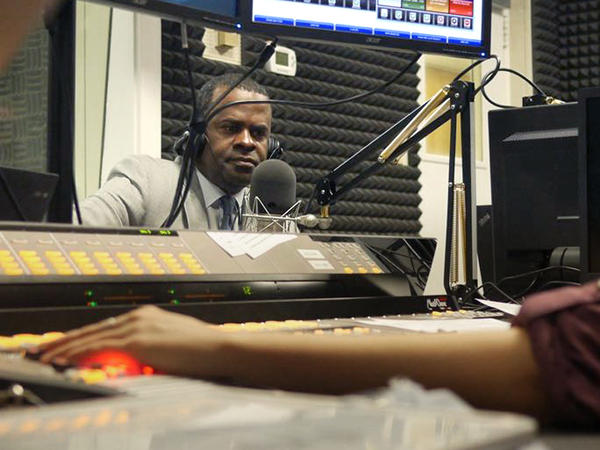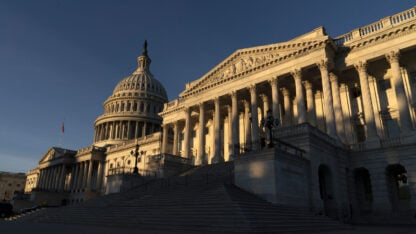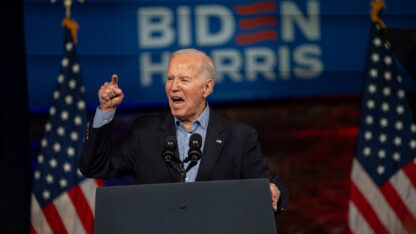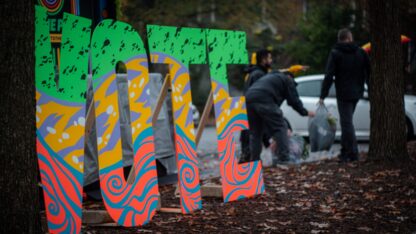Atlanta Mayor Kasim Reed Talks Infrastructure Bond, Falcons Stadium
 “A Closer Look” with Mayor Kasim Reed
“A Closer Look” with Mayor Kasim Reed
Atlanta Mayor Kasim Reed says “every mayor has their issue,” and right now his is the city’s crumbling streets.
On St. Patrick’s Day, city of Atlanta voters will say “yea” or “nay” on $250 million bond package for infrastructure improvements. The city’s overall infrastructure backlog is nearly $1 billion and, quite simply, that means there’s a lot to be fixed. But critics are concerned about what they call a lack of transparency in the referendum.
This week has already been huge for the city’s upcoming building projects. Monday, the Georgia Supreme Court rejected a challenge to financial structuring for the new Falcons stadium. The high court upheld a judge’s decision in May that taxpayer funding for the stadium does not violate the state’s Constitution.
Reed joined Rose Scott and Denis O’Hayer in the “A Closer Look” studio to talk about these and other city issues.
Infrastructure Bond Package
Reed said the city came to the point of needing an extensive infrastructure overhaul like the one presented in tomorrow’s referendum because it has not been “investing in [its] seed corn” in harsh economic times. Reed said now that the city’s economic trends on the rise, it’s time to make long-overdue improvements to the city’s infrastructure. He said the city has so far been “duct-taping” its problems, and needs to get into the habit of capital investment.
“If we’re going to be the dominant economy in the Southeast, we have to do it,” Reed stated.
To people concerned that the infrastructure improvements might prioritize certain parts of town – like Buckhead or the area around the new Falcons stadium – Reed pointed out that the measure received unanimous support from the city council ─ and agreement he calls “very rare.”
Some voters have expressed concern that the project list is only about 90 percent complete, but Reed said this is typical for large projects like this. He expected the project list to be fully confirmed by the end of April, and said he would work to make sure this process occurred with what he calls “robust transparency.” This means taking feedback from private oversight groups, city meetings, and online debate.
Reed explained that the priority of the projects would be determined by the City Council, but certain big projects like traffic light synchronization, road paving and foot bridges are “no-brainers.” As for one of the biggest projects, the Martin Luther King Jr. Natatorium, Reed admitted he might be biased because he used to swim there, but said he feels that project is “the right thing to do historically” since the indoor swimming pool was used “constantly” before its closure three years ago.
Reed said he fully expects the infrastructure bond to pass, citing recent polls. But he said that if the infrastructure bond doesn’t pass, improvement costs will continue to balloon.
Falcons Stadium
After the Georgia Supreme Court decision this morning upholding the bonds for the new Falcons stadium, Reed said to those neighbors who objected to the new stadium, “I’m going to do everything in my power to earn your trust and confidence through action.”
Reed said he understands the skepticism and hurt felt by neighborhoods like Vine City and English Avenue, but says he intends to include them in talks about improvements around the new stadium. He cited Westside Works and the Westside Future Fund as examples of ways in which he hopes to target those areas with philanthropy.
When asked how confident he is that people already in those neighborhoods will be still be able to afford housing after the stadium is built, Reed replied, “Nobody’s going to have a bigger champion than me.”
Ongoing Atlanta Public Schools and BeltLine Property Tax issues
Last time Reed appeared on “A Closer Look,” he addressed the ongoing dispute with Atlanta Public Schools over BeltLine tax payments and the Adair Park school property. But with the infrastructure bond referendum currently taking first priority, Reed said negotiations with Atlanta Public Schools are on the back burner until after the vote. He said he has no definite timeline for an agreement.
“Candidly, I don’t fight two wars at the same time,” Reed stated.
City Annexation
Responding to residents of Druid Hills and unincorporated South Fulton who want to be annexed into Atlanta, Reed said the City of Atlanta is not actively pursuing the annexation of these areas. But, he said, “I would love to have Druid Hills join the city.”
Atlanta Professional Sports
When asked about the Atlanta Braves’ future move to Cobb County – a tense subject for local baseball fans – Reed said, “Let’s stop it about the Braves. Cobb County is Atlanta.”
Reed said he did what he could to keep the team in the city, but is satisfied with plans to convert Turner Field into an expansion of Georgia State University’s campus.
He said that despite concerns about the Hawks being sold to an out-of-state group, the basketball team will stay in Atlanta.
Violent Crime
In response to a double murder that took place last weekend in Little Five Points, Reed said he is very concerned about violent crime in the city, which he said is currently at a 40-year low. He said he met with the chief of police and other prominent members of city government to increase city pushback against violent crimes. He says this pushback will involve more officer overtime, predictive analysis of crime patterns, and more video surveillance.
9(MDAxODM0MDY4MDEyMTY4NDA3MzI3YjkzMw004))








